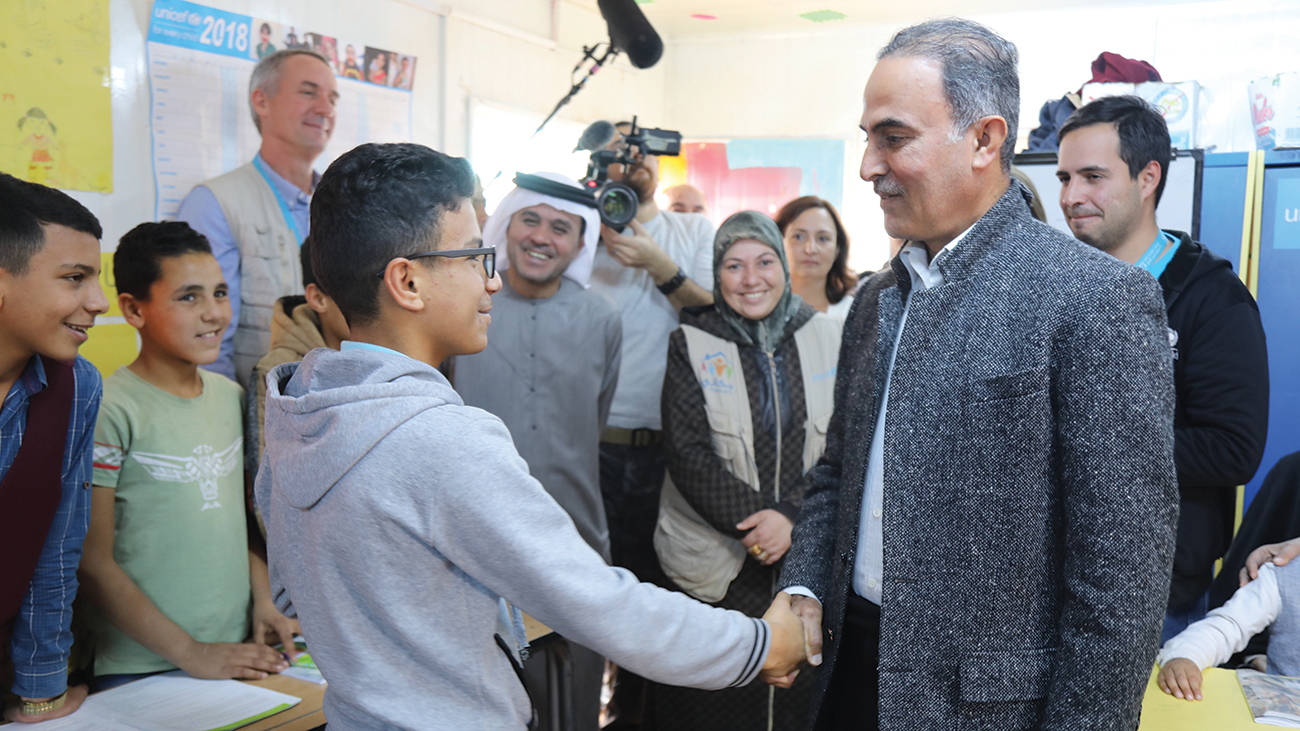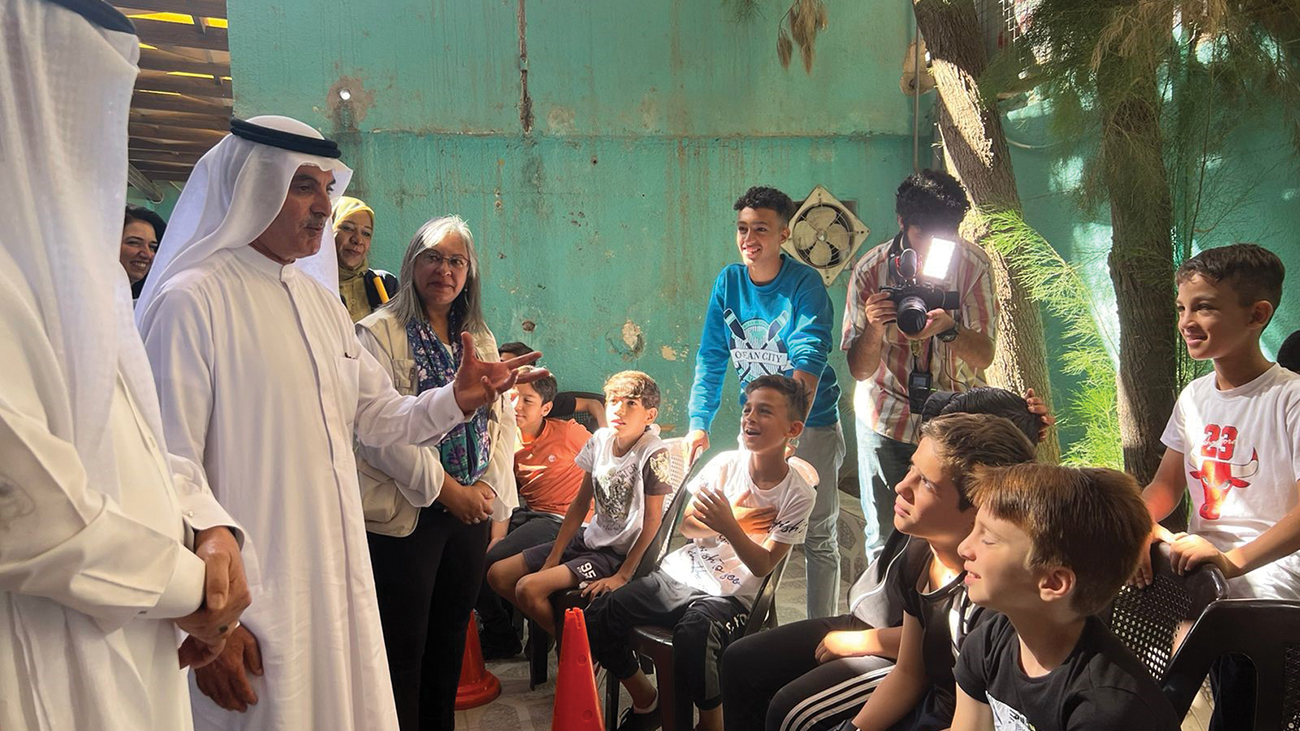Turning Challenges into Opportunities
His Excellency Abdul Aziz Al Ghurair’s purpose-driven philanthropy is making a transformative, enduring impact on Emirati and Arab youth.

In the realm of giving, His Excellency Abdul Aziz Al Ghurair (Industrial Engineering ’77) has always sought to intertwine benevolence with strategy, recognizing that purpose-driven philanthropy holds the power to forge transformative, enduring impacts.
The son of a prominent Emirati businessman and philanthropist, His Excellency came to Cal Poly in 1974, where he earned a degree in industrial engineering with honors. Today he is a businessman and philanthropist and the chairman of the Abdulla Al Ghurair Foundation (AGF), an education-focused non-profit organization based in the United Arab Emirates, that was inspired and founded by his father.
“Since my father founded the Abdulla Al Ghurair Foundation, our mission has been to provide access to high-quality educational opportunities for Emirati and Arab youth,” says His Excellency. “To do that at scale, it is important to ensure that there is a positive impact on education systems, not just opportunities for individuals. Through strategic partnerships and data-driven decision-making, we have remained consistent, and our impact has grown. That is how we contribute to enhancing education in the Arab region.”
Established in 2015, the Abdulla Al Ghurair Foundation is dedicated to empowering Emirati and Arab youth by enhancing their access to top-tier education and skills development opportunities. The largest privately funded philanthropic initiative for education in the Arab region, AGF has benefited more than 115,000 Emirati and Arab youth to date and is targeting 200,000 by 2025.
“Investing in high-quality education opportunities is critical for progress in all societies,” he says. “The Arab region has a lot of potential, but it is facing many challenges, such as unemployment and the skills gap, insufficient access to quality education and online learning, and a lack of widespread high-quality upskilling
opportunities.”

His Excellency (second from left) with Islamic Development Bank president Muhammad Al Jasser (left), meeting with young beneficiaries of the fund at the Al Zaatari camp in 2022. Photo courtesy of the Al Ghurair Foundation
The engineering mindset he honed during his time at Cal Poly has enabled him to evolve his approach from traditional giving to strategic philanthropy. “Having an engineer’s mindset has helped me throughout my life in my thought process and in connecting challenges with opportunities,” he says. “In philanthropy, challenges are often intangible or difficult to define. Applying an engineering mindset to philanthropy is equal to creative problem solving.”
The Learn by Doing approach he developed at Cal Poly has continued to guide his leadership of the foundation, and the decisions he makes are informed by field visits and a deep firsthand knowledge of the communities the foundation serves and the environments in which it operates.
“Strategic philanthropy is about continuous learning,” he says. “Once I understand the challenges and where my family’s philanthropy is most needed, I look at what needs to be done to turn those challenges into opportunities looking at root causes — which is why I insist on a strategic philanthropy approach in all we do.”
At Cal Poly, His Excellency was not only a student but an active community member, participating in group activities and engaging with local media. He served as chairman of the Arab Club and the Muslim Students Association, working to expand community outreach with those groups and developing opportunities for students in those groups and fostering a harmonious community within the university.
“The ethos of Learn by Doing at Cal Poly resonated deeply with me, pushing me to collaborate, contribute and transform challenges into avenues of opportunity,” he says. “This engagement with the broader community was pivotal, underscoring the importance of unity and collaboration for a brighter future.”
In 2018, building on the family’s legacy, His Excellency drew from the foundation’s approach to strategic philanthropy to attend to the unique challenges refugee youth face in conflict zones. The data showed a lack of attention and care to those young people who did not have the luck to be born into safety. He launched the Abdul Aziz Al Ghurair Refugee Education Fund with the intention to ensure that there would be career-focused learning for these vulnerable youth.
The fund has supported more than 85,000 young people, fostering skill growth and higher education access as well as a holistic, compassionate support network. The fund works to transform refugee and host community youth into empowered individuals, actively shaping their futures and positively impacting their adopted communities. As part of these programs, the Education Relief Fund is the most recent example showcasing innovative support for nearly 1,000 medical and health sciences university students facing disruptions from ongoing conflicts, enabling them to complete their education and contribute positively to their communities.
Through our data-driven and evidence-based approach to strategic philanthropy, we are actualizing a more sustainable form of giving
His Excellency realized that a collaborative approach is the best way to support system-level changes in the education sector. Accordingly, the foundation has cultivated cross-sector collaborations and strategic partnerships with the private sector, educational institutions and government entities. “Together with our partners, we are supporting relevant, high-impact solutions to the challenges of today, preparing youth for tomorrow’s opportunities,” he says. “We have launched several initiatives and programs to provide high-quality, market-driven solutions and practical learning opportunities that prepare youth for high-demand sectors in the labor market.”
Since 2021, AGF has established a strategic partnership with the UAE Ministry of Education and nine leading universities in the country to launch the University Consortium for Quality Online Learning (UCQOL). UCQOL conducts participatory assessments and supports institutional capacity building for academic institutions in providing market-driven accredited online programs. Through close coordination and partnerships, AGF enabled the digitization of more than 48 courses online, while building the capacity for more than 130 faculty members for that purpose.
In parallel, the foundation launched the Abdulla Al Ghurair Hub for Digital Teaching and Learning at the American University in Beirut in 2021 to support the design and delivery of high-quality programs to benefit students across the region. To date, the hub has designed and delivered more than 85 online and hybrid courses. Since its launch, around 15,000 students have benefited in total from the supportive work AGF has done to promote high quality online education in the Arab region.
“For me, philanthropy is a long-term commitment that needs scalability, accountability and measurability to ensure our programs are impact-driven,” he says. “Through our data-driven and evidence-based approach to strategic philanthropy, we are actualizing a more sustainable form of giving, and I am genuinely proud of the impact we have achieved thus far.”
As a living example of the results of a Cal Poly education, His Excellency was honored as the College of Engineering’s Honored Alumnus in 2017. He encourages his fellow Cal Poly alumni to give back to their communities and add value to them.
“Thanks to His Excellency and his foundation, thousands of young people across the Arab region can now pursue their dreams of a brighter future,” says Cal Poly President Jeffrey D. Armstrong. “It beautifully illustrates the far-reaching impacts emanating from the Learn by Doing experience.”


